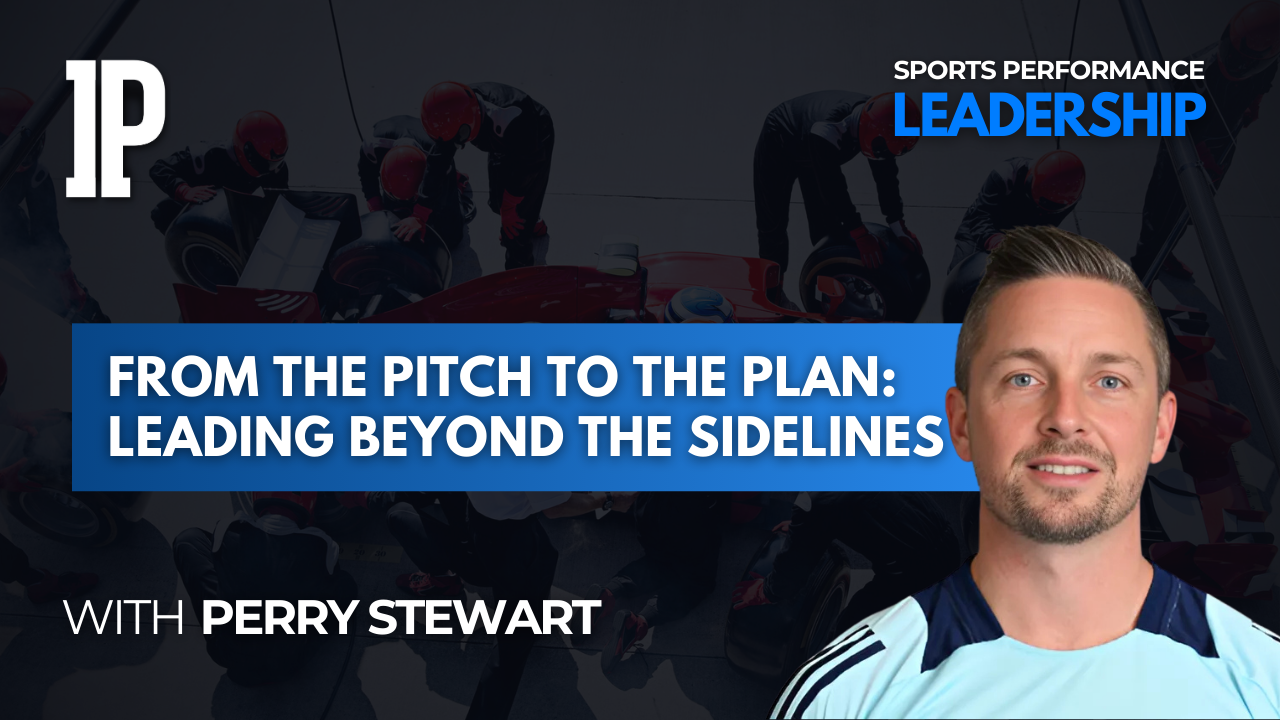From the Pitch to the Plan: Perry Stewart on Leading Beyond the Sidelines
May 05, 2025
In this episode of the Sports Performance Leadership Podcast, hosted by Pete McKnight, we speak with Perry Stewart, Head of Academy Performance at Arsenal Football Club, and a highly respected leader in elite sport. With over a decade of experience across high-performance environments, Perry brings a unique blend of practical coaching expertise, strategic leadership, and a deep focus on developing high-trust, high-performing teams.
Perry holds an MSc in Strength & Conditioning, is pursuing a PhD at Loughborough University focusing on performance support teams, and is accredited by both the UKSCA and BASES. He was also named UKSCA Strength & Conditioning Coach of the Year for Youth Sport, recognizing his outstanding work in athlete development.
Topics Discussed:
-
Unconventional path to leadership – From community fitness roles to elite sport
-
Transitioning from practitioner to strategic leader at Arsenal
-
The importance of people over process in high-performance environments
-
How to build high-trust teams through empowerment and collaboration
-
Learning leadership through experience and reflection, not just formal training
-
Influences from organisational psychology and practical leadership frameworks
-
The enduring impact of classic leadership models like The 7 Habits of Highly Effective People
Key Points:
-
Leadership in professional sport requires a shift from focusing solely on task completion to prioritizing people management. The realization that being responsible for others extends beyond simply executing tasks is crucial. Effective leaders understand that their influence affects not just immediate outcomes but also the development and well-being of the individuals and teams they oversee, which in turn impacts the long-term success of the organization.
-
Early leadership experiences, even if not consciously recognized as such at the time, provide foundational skills for future roles. Managing diverse groups, such as coaching youth or leading community initiatives, helps develop competencies in communication, conflict resolution, and motivation. These formative experiences shape a leader’s approach and adaptability, which are essential when transitioning to more formal leadership positions within elite sporting environments.
-
Transitioning from direct practitioner roles to leadership positions involves accepting a more indirect but broader influence on athlete performance. While direct athlete interaction is reduced, leaders in performance departments impact outcomes by shaping the environment, supporting staff development, and orchestrating collaborative efforts. This wider scope of influence allows leaders to drive systemic improvements rather than isolated interventions.
-
Empowering staff through distributed leadership and project-based initiatives fosters innovation and engagement. By assigning project leads and coordinators, and supporting them with guidance rather than directives, leaders enable team members to take ownership of processes. This approach often results in creative solutions and higher-quality outcomes than top-down management, as diverse perspectives and expertise are leveraged collaboratively.
-
Systematic and organized approaches are essential for implementing performance projects across large, multidisciplinary organizations. Identifying gaps in provision, assembling diverse teams with complementary skill sets, and establishing clear timelines and outcome measures are fundamental steps. Regular check-ins and feedback points ensure accountability and allow for course corrections, facilitating the successful delivery of complex initiatives.
-
Leadership success is strongly linked to the ability to identify and nurture the strengths and potential of team members. Recognizing the unique experiences and knowledge each individual brings, and intentionally composing teams to maximize diversity and commonality, enhances problem-solving and project effectiveness. Leaders must be strategic in team selection, ensuring both innovation and cohesion.
-
Creating a culture of collaboration and open communication is vital for high-performing teams. Leaders should encourage staff to share ideas, challenge assumptions, and provide constructive feedback. This collaborative environment not only improves project outcomes but also supports professional development and job satisfaction among staff, which is critical in high-pressure sports settings.
-
Leadership development is an ongoing, reflective process. Leaders must continually assess their own effectiveness, seek feedback, and adapt their style to meet the evolving needs of their teams and organizations. This self-awareness and willingness to grow are hallmarks of effective leaders in the dynamic context of professional sport.
-
Delegating responsibility and providing autonomy within structured frameworks enhances motivation and accountability among staff. Leaders should set clear expectations and milestones but allow teams the freedom to determine how objectives are achieved. This balance between structure and autonomy promotes ownership and drives higher levels of engagement and performance.
-
The ultimate impact of leadership in professional sport is measured not just by immediate results but by the legacy of processes, culture, and people development. Leaders who focus on empowering others, fostering collaboration, and systematically addressing organizational needs contribute to sustained excellence and adaptability, positioning their teams and organizations for long-term success in a competitive environment.
Where you can find Perry:
• X
Sponsors
Hytro: The world’s leading Blood Flow Restriction (BFR) wearable, designed to accelerate recovery and maximise athletic potential using Hytro BFR for Professional Sport.
Remaker: The Portable Strength Tracking Ecosystem. Remaker provides real-time insights to optimise your performance, making even the smallest improvements in your strength training visible in an engaging and powerful format. Remakers integrate seamlessly with the exercise equipment you already use, and the app provides meaningful metrics for every rep, of every set, of every exercise.
VALD: makers of the Nordbord, Forceframe, ForeDecks and HumanTrak. VALD Performance systems are built with the high-performance practitioner in mind, translating traditionally lab-based technologies into engaging, quick, easy-to-use tools for daily testing, monitoring and training.




